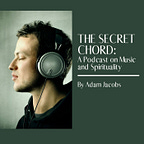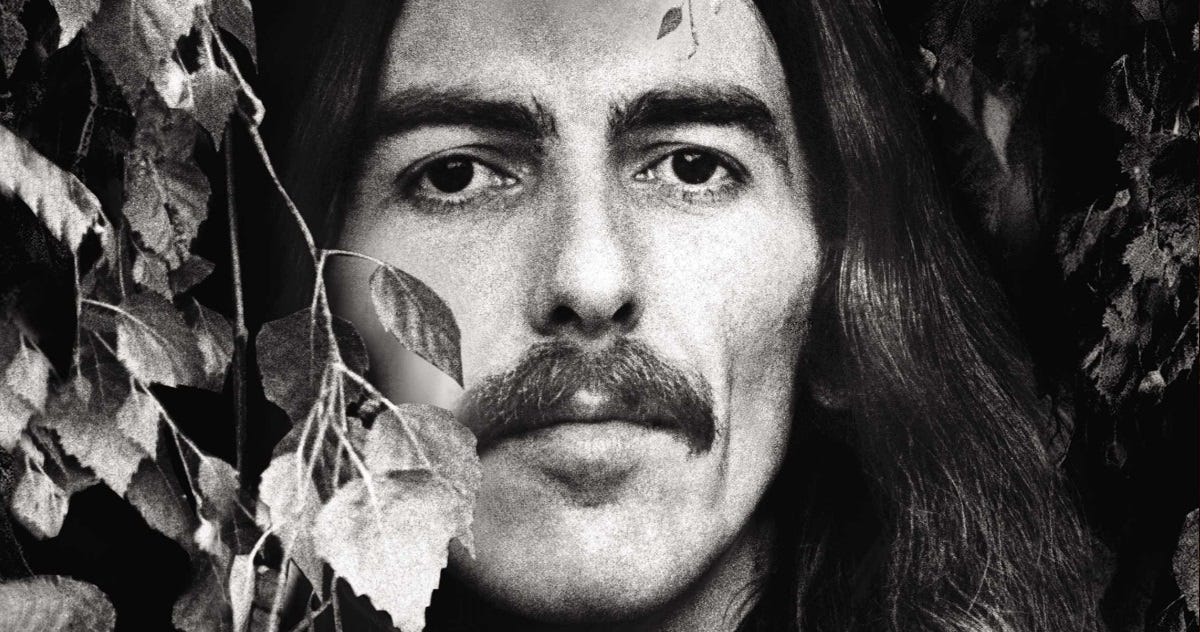Transcript
Hello all, and welcome to this week's episode of The Secret Chord. Before we even get started, I made a serious omission way back in episode number two. We were discussing the music of Gene Clark, the great singer-songwriter, and former member of the Byrds. And I quoted somebody online who had written something really fantastic about one of Gene's songs, Strength of Strings, and I did not give him proper credit, and I would like to do so now. His name is Tom Sanford and he writes a blog called Clark Profile, and it's really fantastic. He's an amazing writer and I highly recommend if you're a fan of Jean Clark's or a music fan in general, that you go check out his blog.
So thank you, Tom. And this week we're going to focus on the music of George Harrison. You may know him as the lead guitarist of a little outfit called The Beatles, who were probably the most influential group of musicians in all of history. Not just rock history, but history in general. And he played obviously a prominent role. He was known as the Quiet Beatle. But his background, he was born in England in 1943. He is a singer-songwriter, and he wrote several of the Beatles' big hits, but in general, he had one or two songs per album.
Paul McCartney and John Lennon took most of the stage in terms of the songwriting credits and the stuff that actually made the album. But the stuff that he did do is extremely good. You may know the song Taxman or Within You Without You, or the very excellent song While My Guitar Gently Weeps and the very well-known Here Comes The Sun and something. These songs are pretty deep. A lot of Beatles songs were deep. There was something about George that was very reflective and very refined and makes him an extremely good candidate for the kinds of discussions we have here on this podcast.
So the song that we're going to discuss today is called Give Me Love. It was the opening track of his 1973 album called Living in the Material World. That was way before Madonna did it. And the police have a tune also called Spirits in the Material World. I think the title of his album and some of his other albums as well are reflective of a very spiritual mindset that he had. And it became the album's lead single Give Me Love. In May of that year, it became Harrison's second US Number one hit the first one being My Sweet Lord, which was also an overtly spiritual song. Interestingly, when he hit number one, he knocked out Paul McCartney's song, my Love from the Top of the Billboard 100, which was the only occasion that two former Beatles held the top two chart positions on the Billboard 100 in America.
So there is a lot to say about this song and about George Harrison in general. Just want to highlight a couple things before we go right into it. One is it's a very straightforward and in some ways simple tune. It's an interesting structure in that it begins with a chorus, goes to a bridge, goes back to a chorus, and then goes back to a bridge. So the song structure is different, but that's it. There are just simple lyrics, simple ideas, and it seems to me that simplicity is an excellent way of expressing spirituality.
It seems to me that simplicity is a very appropriate quality of spiritual music and spiritual expression. Ultimately, we would say that the simplest thing in the universe is God himself, that there's no contradiction between profundity and simplicity, and that expressing yourself clearly to the points unambiguously is often an important spiritual concept. So this is a song that it made me think of that but was written a bit later and came from the soundtrack of Godspell. Let's listen for one minute,
So in this song, day by day, those are the only lyrics. Day by day, day by day, oh, dear Lord, three things I pray, and then it goes on. But that same idea over and over and over, and that same concept exists within Hasidic music. For instance, there are tunes called nigunim, which are basically one idea. It's one verse that gets sung again and again and again. And it's not uncommon in those circles for people to dance around and sing that one concept for a really long time. And part of the idea is that the message within the song should sink in. So I love the idea of a simple, straightforward idea in a song, that doesn't need a lot of explaining, and you're going to do it again and again until it sinks in. Let's play the first few minutes of this tune and then we'll talk a little bit about the music and some of the ideas behind it. Give Me Love by George Harrison.
I think the music here is equally as beautiful as the lyrics. And listen to George's voice here. What do you think of it? To me, this is a very profound sound that he produces. It's earnest, it's humble, and I would also say slightly pained. That's how his voice sounds to me. He really is reaching somewhere deep and sharing it with us as so many great artists do. And as we've mentioned already so many times in this podcast, when these singers share from the depths, it's really impactful. He's also playing the slide guitar and I think doing a fantastic job. It's a very rich, comforting, expansive, harmonious sound. And just the combination of that slide guitar and his voice behind it is so, so nice. And I love the chord progression as well. It's not complicated, but it's interesting and fun and goes someplace and it brings you along with it.
It's well known that George got very heavily involved in Eastern spirituality as it happens. When I was in graduate school, I was lucky enough to take a course in Indian music, and just like in Western music where we have something called solfege: do re mi fa, so, la, ti do. There's also an Indian solfege the first three notes of which are sa, re, ga. And one of the things that our teacher had us do, which was a very interesting exercise, was to sing one note, speaking of simplicity, just to try to get one note right. And we sang that note for a really long time, something like 20 straight minutes. And the fascinating thing is, while you're singing that singular note altogether, you start to lose track of where it is. You feel yourself drifting upwards, downwards. You just don't have a firm grip on where that thing is.
But after a while, it starts to come back and it comes back stronger and more firmly than it was before. I know this is a bit of a weird thing to contemplate. You could try it yourself if you wanted to, but my experience of it was that even just doing one thing in the most basic sense, trying to understand one note amongst all of the notes was pretty tough. And you got lost and you had to find your way back to the stability of that original note. And that was a lesson in Eastern music of how to find the deepest roots within the complete simplicity of the very first note of the scale. Some part of me thinks that that's part of what he's doing here, is the promotion of these simple ideas, but nonetheless, the depth and the ultimate grounding that comes from them when you really come to understand them in the way that you should.
He says, “Give me love. Give me love. Give me peace on earth. Give me light, give me life. Keep me free from birth,” which I think is the most interesting line here. “Give me hope. Help me cope with this heavy load, trying to touch and reach you with heart and soul.” I think that is just such a nice set of lyrics. It says everything. And once again, we spoke about Pete Townsend last week. We have spoken about other artists who are all trying to do the same thing that George is. In my opinion, a musician is someone who is channeling the divine very often. They themselves are not aware of it sometimes. In the case of George Harrison, he's totally aware of it. So what does he mean, free from birth? Keep me free from birth. I don't think that he means he doesn't want to go to the maternity ward.
It's his Hindu ideas on reincarnation. And while it would be a fascinating thing to go into the distinctions between reincarnation, say in Hinduism, Buddhism, and Judaism, suffice it to say that like Hinduism and Buddhism, Judaism believes in reincarnation. Judaism is much more of an Eastern-like religion than it often gets credit for. In the same way that the land of Israel is located between the east and west, right at the tip of Asia, right near Europe. So too its ideas sort of straddle both worlds. The primary difference is that unlike Buddhism, which wants to escape what's known as the wheel of Samsara, the cycle of births and deaths, and ultimately enter into the state of nirvana, which in their conception is a merging with the infinite, a blending into the ultimate reality so that your individual self is lost. Interestingly, Hinduism, along with Judaism believes that the continuity of the consciousness continues even after the wheel of Samsara has ended, that you always maintain what they call atman, your primary self, your essence. Now let's play the bridge:
So George does an interesting thing here, a clever thing. If you listen carefully, he says, “Oh my Lord, please take, hold my hand that I might understand you.” Again, another simple and beautiful idea, but the way he does it is he produces the word Om. Oh…My Lord. And I looked up what the word ohm means, an eastern thought. And like many things, there are quite a few definitions. But here's one, it says, om is part of many mantras in Tibetan Buddhism, and it's a symbol for wholeness, perfection, and the infinite. So isn't it interesting to note that the Hebrew word for wholeness is Shal-om?
Think there's a connection? I think so. Regarding his faith, because at the end, George Harrison was a religious guy. He did have an impact on the way that people in the US and probably around the world viewed Eastern spirituality. The Beatles did spend some time in India, although that experience didn't end up so great for them, George stuck with it for the remainder of his life, and it was a profound influence on him. I wonder if most of his fans are aware of exactly how much this spiritual tradition influenced him and his music. But just to make it completely clear regarding other faiths, he once remarked quote, “All religions are branches of one big tree. It doesn't matter what you call Him, just as long as you call.” And the Him was capitalized, he thinks it's important. He doesn't care how you get there, but he wants you to go.
And interestingly, speaking in 1971 about his plans following the success of his album, All Things Must Pass, they asked him what he wanted to do with his life, and his answer was, “I want to be God-conscious. That's really my only ambition and everything else in life is incidental.” Well, that's a powerful endorsement for spirituality coming from one of the most successful musicians in world history.
I hope that we can all take inspiration in general from these people and to peek into their worlds, through the music that they made and come to have a greater and higher understanding of what life is and what our ultimate goals are individually and collectively. I hope you've enjoyed this beautiful song and the extremely interesting personality of George Harrison. And as always, I look forward very much to speaking with you again next week. Wishing you all the best.












